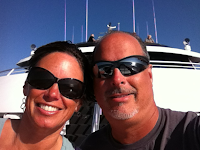Anne Marie Roderick will be presenting on her interfaith work during Peace Forum in the ESR Dining Room on Thursday, January 31. Her presentation is one of several events taking place during Earlham College's Religious Emphasis Week, which includes a lecture by Interfaith Youth Core founder Eboo Patel. Below is a reflection from Anne Marie on what led her to pursue interfaith ministry.
When I was in middle school growing up in New York City, I had a Muslim friend named Salima. Salima and I were close. We ate lunch together, went over to each other’s houses after school, hung out on weekends. When planes hit the World Trade Center towers On September 11th, 2001 we were both in eighth grade. Our
whole school was in panic; our principal told us that World War III may
had just begun, rumors about the attack were flying from classroom to
classroom; students and teachers were desperately trying to reach
friends and family all over the city. In all the frenzy, I don’t
remember talking to Salima much that day at school, but after I was safe
at home with my family and some of our friends who couldn’t get to
their own homes, I called her.
Everyone was somber, but Salima’s voice over the phone was trembling. “Two of my cousins were in one of the towers,” she said. “They’re not answering their phones, we don’t know where they are.” In
the hours and days that followed, Salima and I called her cousins’ cell
phones in case they or someone with information about them might pick
up and we put missing signs up around the city. Weeks
later I attended a public memorial service at Yankee Stadium with
Salima and her family for all of the lives lost in New York on that day.
Back at school, most things eventually returned to normal, but Salima’s life didn’t. In addition to losing her cousins, Salima became the target of anti-Muslim slurs. Kids at school teased her for looking “Arab” and she was afraid of being harassed or worse by people on the streets. At
the time, I didn’t have the tools to support Salima; I didn’t know how
to stand up for her, how to challenge those around me who called Muslims
and Arabs terrorists. I
thought it would all pass. I didn’t see that our world was entering an
era of increased religious intolerance and violence that would continue
into my adulthood.
I mark the events following September 11th as
the beginning of my commitment to interfaith work, though I wouldn’t
realize that until more than 6 years later, during my first year at
Earlham. Now that I am attending Union Theological Seminary and
preparing for a life in ministry, I feel even more passionate about the
need for interfaith cooperation, especially on the part of those
entering Christian ministry.
If
we are connected to faith and spiritual communities we have a crucial
role to play in promoting religious pluralism and engaging religious
diversity in and around those communities. As current and future
faith/spiritual leaders, our work can begin by claiming the stories that
most inform our own faith journeys. Once we know our stories, we can
begin to share those stories with others and seek out the stories of
those who are different from us.







